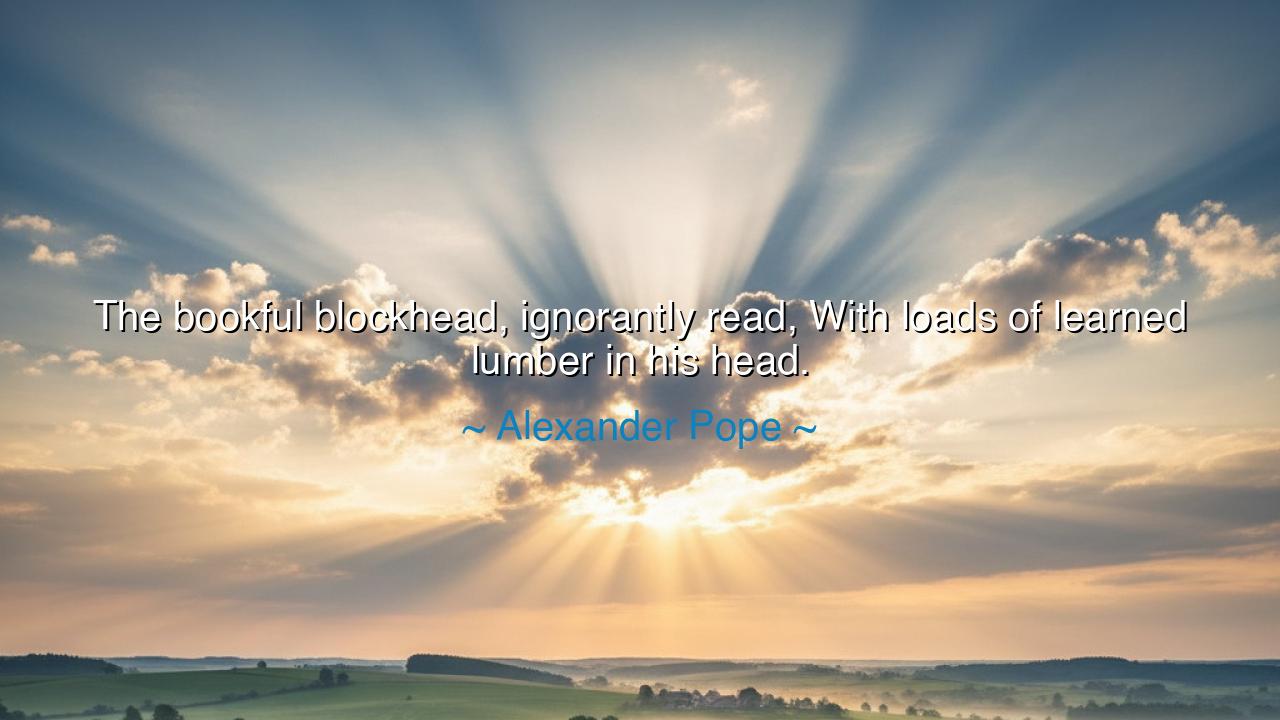
The bookful blockhead, ignorantly read, With loads of learned






In the golden age of reason and refinement, Alexander Pope, the master craftsman of verse and wit, wrote these immortal lines: “The bookful blockhead, ignorantly read, With loads of learned lumber in his head.” From his Essay on Criticism (1711), these words strike with both elegance and sting. Pope, with his razor-edged intellect, sought to remind his readers that knowledge without understanding is vanity, and that the mere possession of learning does not make one wise. His tone is sharp, almost merciless, for he despised the hollow scholar—the one who fills his mind with facts but never grasps their meaning, who reads everything but comprehends nothing.
To understand the origin of this saying, one must step into Pope’s world—the Enlightenment, an age that exalted intellect and reason. Books multiplied, universities flourished, and learning became a badge of pride. Yet Pope saw that not all who read were enlightened. Many sought reputation rather than truth. They amassed quotations and arguments as a miser hoards gold, but their minds were cluttered, not illuminated. Such men, he said, were like libraries without order, their thoughts buried beneath the “lumber” of other men’s ideas. Theirs was not wisdom, but mimicry.
In the phrase “bookful blockhead,” Pope gives us a paradox—a man full of knowledge but empty of understanding. The phrase itself drips with irony. The “blockhead” is dense, immovable, incapable of insight, yet his head is full of books, overflowing with the knowledge he cannot use. Pope’s metaphor of “learned lumber” is equally rich: knowledge, when misused or misunderstood, becomes a burden rather than a blessing—a heap of wood weighing down the soul instead of kindling the fire of thought.
History abounds with examples of this folly. Consider the tale of Socrates in ancient Athens, surrounded by sophists—men who claimed wisdom because they could recite poetry, quote philosophy, or argue on any side of a question. Yet Socrates, the humblest of them all, declared himself ignorant and thereby proved himself wise. When the oracle called him the wisest man in Athens, he replied that he knew only one thing—that he knew nothing. The sophists were bookful blockheads: well-read, eloquent, and admired, yet trapped in the prison of their own vanity. Socrates, though he wrote nothing, was wise because he sought truth, not triumph.
So too in every age there are those who mistake information for insight. In the modern world, the same danger returns under new names. We gather data but lose discernment; we memorize, but we do not meditate. Knowledge, like food, must be digested to become nourishment. To read a thousand books without reflection is to carry “learned lumber” in the mind—it may give weight, but not strength. True wisdom, as Pope teaches, is not how much we know, but how deeply we understand, how fully we integrate knowledge into life and virtue.
Pope’s warning is not a rejection of learning, but a call to sincerity and humility in the pursuit of wisdom. He invites the student to read less but think more, to value the quality of thought over the quantity of words. The wise reader approaches each book as a living conversation, not a conquest. He questions, reflects, and connects ideas to experience. In this way, the book becomes a bridge to understanding, not a burden to carry.
The lesson, then, is this: seek wisdom, not mere knowledge. Do not read to impress, but to improve. Let every idea pass through the furnace of your judgment, and let no thought remain untested by reason or experience. Be not a collector of words, but a lover of truth. For the world is filled with those who know much and understand little, who have read everything and learned nothing.
Therefore, my children of the mind, take Pope’s counsel to heart. Do not become the bookful blockhead, weighed down by the wisdom of others but barren in your own thought. Instead, be as the philosopher who reads with purpose, feels with depth, and acts with integrity. Let your learning be light, not lumber; a fire that warms the heart and illumines the path of others. For it is not the fullness of your head that matters, but the clarity of your mind and the purity of your soul.






AAdministratorAdministrator
Welcome, honored guests. Please leave a comment, we will respond soon